
5 Strategies for Success When Teaching Online
- Subject:
- Educational Technology
- Higher Education
- Material Type:
- Teaching/Learning Strategy
- Author:
- Jacob Spradlin
- Date Added:
- 09/28/2023


5 Strategies for Success When Teaching Online
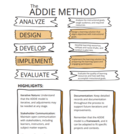
A beginner handout for becoming familiar with what ADDIE is and how each step falls in the process of Instructional Design. Learners can use as a visual/verbal reminder.

Activity Sheet: This document provides an overview of how online education helps remove common barriers to accessing education, such as geographical restrictions, disabilities, scheduling conflicts, social stigma, and financial constraints. It uses simple icons and explanations to illustrate how the flexibility and accessibility of online learning platforms can expand educational opportunities to a broader range of students. This would be a useful resource for those exploring online education options, comparing modalities, or looking to increase enrollment through distance learning programs.
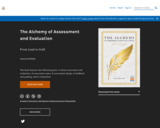
This comprehensive guide illuminates the art and science of educational assessment, blending ancient alchemical wisdom with modern AI innovations. Part one lays the foundation, exploring essential principles of assessment and evaluation and its pivotal role in shaping learning outcomes. Part two delves into diverse assessment types, from formative assessments driving real-time adjustments to summative evaluations measuring overall achievement. Part three offers expert guidance on crafting effective assessment designs, ensuring authenticity and inclusivity. Part four examines the alchemy of feedback and grading, empowering educators with strategies for constructive engagement and growth. Part five focuses on evaluations, showcasing methods to assess program effectiveness and student progress over time. Whether you’re an educator refining assessment practices or an instructional designer harnessing AI’s potential, this book equips you to turn every educational challenge into a golden opportunity.
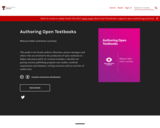
"This guide is for faculty authors, librarians, project managers and others who are involved in the production of open textbooks in higher education and K-12. It includes a checklist for getting started, publishing program case studies, textbook organization and elements, writing resources and an overview of useful tools.

The attached file is a course schedule or outline template in a Word document. It contains a table with columns for week, dates, topic, and activities/assignments. The table has rows for each week of a 15 week course, with dates, topics, and placeholder activities and assignments filled in.
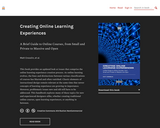
This book provides an updated look at issues that comprise the online learning experience creation process. As online learning evolves, the lines and distinctions between various classifications of courses has blurred and often vanished. Classic elements of instructional design remain relevant at the same time that newer concepts of learning experience are growing in importance. However, problematic issues new and old still have to be addressed. This handbook explores many of these topics for new and experienced designers alike, whether creating traditional online courses, open learning experiences, or anything in between.
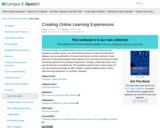
This book provides an updated look at issues that comprise the online learning experience creation process. As online learning evolves, the lines and distinctions between various classifications of courses has blurred and often vanished. Classic elements of instructional design remain relevant at the same time that newer concepts of learning experience are growing in importance. However, problematic issues new and old still have to be addressed. This handbook explores many of these topics for new and experienced designers alike, whether creating traditional online courses, open learning experiences, or anything in between.

This customizable Excel template provides a master framework to plan and organize learning activities for online courses. The template contains sheets to outline course modules, schedule weekly learning objectives and activities, plan assessments and assignments, and track student progress. Columns are provided to capture activity details like name, type, description, duration, assignments, and more. The template is fully editable so course designers can add or remove sheets as needed to match their planning process. By providing a structured planning template, this Excel file aims to help streamline the instructional design process for online learning. Use it to map out engaging and effective learning experiences for modern online courses.
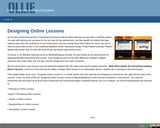
Designing Online Lessons

Presentation of ethnographic research on AI in higher education and future jobs.
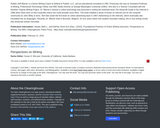
Foundational Practices of Online Writing Instruction, edited by Beth L. Hewett and Kevin Eric DePew, with associate editors Elif Guler and Robbin Zeff Warner, addresses the questions and decisions that administrators and instructors most need to consider when developing online writing programs and courses. Written by experts in the field (members of the Conference on College Composition and Communication Committee for Effective Practices in OWI and other experts and stakeholders), the contributors to this collection explain the foundations of the recently published (2013) A Position Statement of Principles and Examples Effective Practices for OWI and provide illustrative practical applications. To that end, in every chapter, the authors address issues of inclusive and accessible writing instruction (based upon physical and mental disability, linguistic ability, and socioeconomic challenges) in technology enhanced settings.
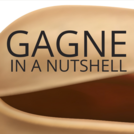
A half sheet printable to scan a QR code which takes the learner to a scorm package which gives an overview of Gagne. There are also videos included in the package.
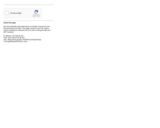
The Administrator Quick Start Guide seeks to support community college administrators in enabling the use of OER to address online learning on their campuses. The guidebook provides quick tips and starting points including:
A list of evidence-based practices and checklist considerations to support campus administrators in the transition to OER for online learning.
Resources to support campus leaders in impacting and developing OER policy supports, including example student government resolutions, district board resolutions, and academic senate resolutions.
Examples of how campus leaders and colleges across California have facilitated their transition to OER.

A half sheet printable to scan a QR code which takes the learner to a scorm package giving an overview and quiz of Kirkpatrick's Model of Assessment.
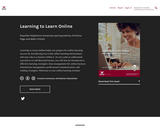
Learning to Learn Online helps you prepare for online learning success by introducing you to the online learning environment and your role as a learner within it. As you come to understand yourself as an self-directed learner, you will also be introduced to effective learning strategies: time management for online learners, information management, professional communication, and reading strategies. Welcome to your online learning journey!
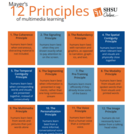
A beginner handout for becoming familiar with Mayer's. Learners can use as a visual/verbal reminder. A link to the original content is provided.
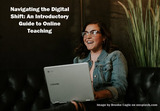
Introducing "Navigating the Digital Shift: An Introductory Guide to Online Teaching," a comprehensive mini eBook meticulously designed to facilitate professors in transitioning seamlessly to online or digital instruction. This invaluable resource serves as a beacon for educators venturing into the realms of virtual teaching, providing concise, practical insights coupled with actionable tools to navigate the digital education landscape effectively. Within its pages, professors will uncover a plethora of practical tables, user-friendly templates, and detailed checklists, each crafted to demystify the online teaching process and ensure a smooth transition. Whether you're a seasoned educator or a newcomer to the teaching profession, this guide offers tailored solutions, best practices, and innovative strategies to set up every new online instructor for unparalleled success. Dive into the world of online instruction with confidence, equipped with the knowledge and tools necessary to create engaging, inclusive, and effective learning experiences in the virtual classroom.
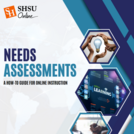
A beginner guide for conducting needs assessments. Page 2 provides a definition of needs assessment and discusses the importance and process of conducting needs assessments. Page 3 visualizes the process as steps 1 through 6 which include: defining the purpose and goals, identifying stakeholders, gathering data, analyzing data, designing the course, and evaluating and adjusting content.
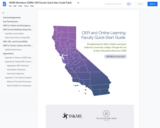
The Faculty Quick Start Guide is an outcome of a project by ISKME, supported by a grant from the Michelson 20MM Foundation, to conduct a study and develop a set of resources to accelerate OER use for distance education, especially the urgent shift to remote learning during the pandemic in 2020. The Guide, created in collaboration with a selection of OER and online education champions across California community colleges (CCC), contains:
- Models and approaches to online learning, and to emergency remote learning in the context of COVID-19;
- How and to what extent OER fits into these models, and local and state-level supports needed for its integration and sustainability;
- Design considerations for integrating OER in online learning, including pedagogical and platform considerations;
- Curatorial practices, such as using OER curation tools and aligning curated OER to learning outcomes; and,
- Starting points and tips for colleges and faculty who want to initiate OER integration into distance education.
Tailored to faculty and campus administrators both in California and beyond, the Guide has the aim is to enable system-wide shifts to meet postsecondary institutions’ long term goals for distance learning, and faculty’s emergency plans for remote learning in response to the COVID-19 and potential future crises.
The Guide is also available as a PDF for download: https://drive.google.com/file/d/17AXs30dZeLOrGeNBQ-ISc_OJXIxE9xtB/view?usp=sharing.
See the companion guide for administrators at: https://www.oercommons.org/courses/iskme-michelson-20mm-oer-campus-administrator-quick-start-guide-public/edit